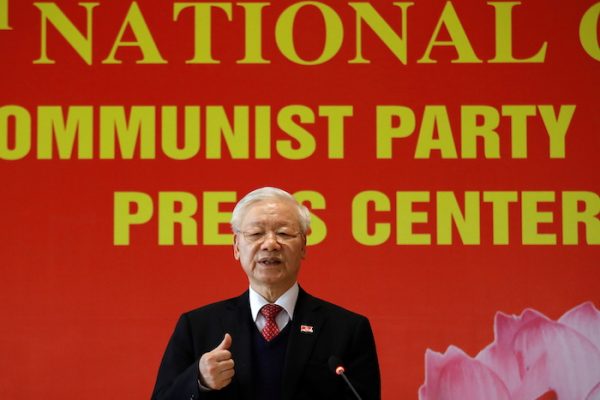The Congress began with an upbeat tone. Vietnam has been lauded by the international community for its handling of the COVID-19 pandemic. With a population of 97 million people, Vietnam has only recorded 35 deaths. It seems to have done all the right things — closing borders early, heavily controlling locally targeted confinements and maintaining transparency in its communication strategy to encourage patriotic behaviour to combat the virus. While the rest of Southeast Asia is in recession, Vietnam recorded a growth rate of 2.9 per cent in 2020.
Vietnam’s chairmanship of ASEAN in 2020 was deemed a success culminating in the signing of the Regional Comprehensive Economic Partnership and the EU–ASEAN Strategic Partnership Agreement. Still, the international environment with continued China–US tensions under the new Biden administration, as well as no respite in Chinese assertiveness in Vietnam’s neighbourhood, augur for a difficult period ahead.
For the Party leadership, under such an unstable environment — both internationally and, because of the continuing pandemic, domestically — the Party Congress was a good time to consolidate, maintain the status quo and ensure the CPV deflects any criticism.
As expected, responding to appeals for consensus and unity, Nguyen Phu Trong was re-elected as General Secretary of the CPV. This rather bland grandfatherly custodian of Marxist–Leninist doctrine is reassuring not only to Party apparatchiks but also to the general population because of his aggressive campaign to uproot corruption. Trong’s protege Tran Quoc Vuong was rejected by the last two plenums of the Central Committee, so Trong became the default option.
For some observers, reliance on the old guard signifies an inability to prepare a new generation of leaders, especially as no consequential doctrinal innovations have emerged since Doi Moi (‘change for renewal’) in 1986. It is problematic for the CPV’s long-term viability to have a membership stagnant at approximately 5 per cent of the population and one that is increasingly ageing and male. Those under 50 make up only 17 per cent of the 200-member Central Committee. Women make up only 9.5 per cent of the Central Committee and the 18-member Politburo only has one woman.
Trong will also remain the President of Vietnam — a position he acquired after the death of Tran Dai Quang in 2018. This has led to comparisons with Chinese President Xi Jinping. This is misleading as Trong does not possess similar levers to maintain his position in a factionalised CPV and his personal modesty and ill health does not seem to display the same lust for power as Xi. He is certainly no harbinger of a ‘Vietnamese Dream’.
Trong was given an exception for a third term beyond the obligatory retirement age of 65. But he was not alone — of the 200 members in the Central Committee, there were nine other exceptions. Among these was Nguyen Xuan Phuc, the current Prime Minister. It appears that he was not chosen to be General Secretary because he does not come from the Communist heartland in the north. Still, he is expected to become president later in the year once designated by the National Assembly. The question is whether he will then make the presidential role more important than it was previously.
During Vietnam’s chairmanship of ASEAN in 2020, and in dealing with the COVID-19 pandemic, Phuc was omnipresent, apparently in part due to Trong’s real, or ostensible, ill health. Pham Minh Chinh, current head of the Central Commission for Organisational Affairs and number three in the Politburo, is foreshadowed to replace Phuc as prime minister — a sign of hierarchical continuity. But, as with the relationship between Trong and Phuc, it also indicates that power-sharing arrangements in Vietnam’s collegial leadership are also questions of individual and factional dynamics.
Since the seminal 6th Party Congress of 1986, which heralded the policy of Doi Moi, the CPV’s congresses attract increasing international attention. They are seen as providing guidelines for future policies as well as designating the key actors in the Vietnamese regime.
The 13th Congress was a disappointment then for those seeking significant changes. What emerged is an interim arrangement to mark time, so as to ensure the CPV’s grip on power. It remains to be seen whether this hiatus impacts other bodies in Vietnam — notably at the provincial level and, for example, on the ‘consultative authoritarianism’ of the Vietnamese National Assembly.
Hien Do Benoit is Associate Professor at the National Conservatory of Arts and Trades (CNAM) and Research Fellow at the Interdisciplinary Laboratory for Research in Action Sciences (LIRSA), Paris.
David Camroux is an Honorary Senior Fellow at the Center for International Studies (CERI), Sciences Po, and a Professorial Fellow at the University of Social Science and Humanities, National Vietnam University, Hanoi. He is a former Dissemination Coordinator for the CRISEA project on Southeast Asian regional integration of the EU’s Horizon 2020 Framework Programme.

